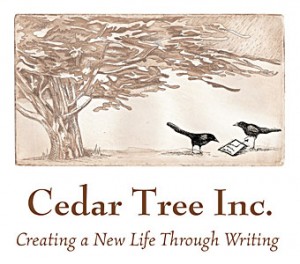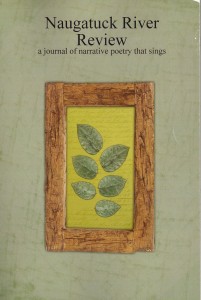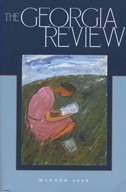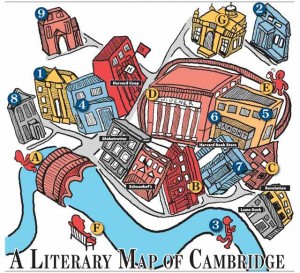The Bitter Oleander – 2008
Finely etched is how I would define the work in this issue of The Bitter Oleander. Take Carolyn Gelland’s poem, “Wild Cat,” for example: Continue reading “The Bitter Oleander – 2008”
At the NewPages Blog readers and writers can catch up with their favorite literary and alternative magazines, independent and university presses, creative writing programs, and writing and literary events. Find new books, new issue announcements, contest winners, and so much more!
Finely etched is how I would define the work in this issue of The Bitter Oleander. Take Carolyn Gelland’s poem, “Wild Cat,” for example: Continue reading “The Bitter Oleander – 2008”
Within six months of placing a small ad in Poets & Writers, the editors of The Broome Review received more than 1,000 submissions to consider for this inaugural issue. They selected the work of 28 poets, including poems by such prolific and well known poets as Stephen Dunn, Timothy Liu, Lawrence Raab, and Philip Dacey; five fiction writers; and three essayists. Continue reading “The Broome Review – Spring 2008”
There seems to be general agreement that one of the better online literary magazines today is failbetter.com. They get their name from the short poem by Samuel Beckett: “Ever tried. / Ever failed. / No matter. / Try again. / Fail again. / Fail better.” – certainly a philosophy we could all fruitfully adopt. I am particularly impressed with the layout of this journal, where everything is easily accessible from the home page. The latest postings are found at the top, and scrolling down allows one to sample recent fiction, poetry, visuals, and interviews in a descending chronological order. The editors also appear to be rather selective in accepting new work: only six short stories are presented on the site from July 15 to November 4. Continue reading “failbetter.com – Fall/Winter 2008”
The fiction and poetry in this issue of Harpur Palate seems focused on examining the familiar through an exotic lens, and vice versa. In “Squander,” Jenny Hanning does interesting work with her reverently Kafka-esque premise. Katherine, a junior high English teacher and mother, wakes up as the family cat after a fatal car accident. Hanning makes good use of the material. She allows the playfully named Katherine to truly be a feline (she gifts her former husband with half-digested animals), and balances this with observations provided by her residual human perception. Continue reading “Harpur Palate – Summer 2008”
Hobart # 9 takes us back to our youth when video games were black and white, hookers were a few keystrokes away, playground ballgrabbing was cause for nasty nicknames, and mothers left fathers. The stories in this collection are as addictive as the games their characters play – pool, Scrabble, chess, poker, Jenga, blackjack, and Magic: The Gathering. Continue reading “Hobart – 2008”
I like the juxtapositions in this issue of MR. On the left hand side of the page is Karen Kevorkian’s poem, “Crowded Rooms,” with lines as lyrically wrought as “the white coned / datura whose tissue cup / I lifted and there / it would be rankly sweet / in a starving time,” and on the facing page Fancine Witte’s sudden fiction, “The Way the Vase Got Broken”: “Was the cat. First, he did his little purr thing, followed by his sinewy arch thing. This was all topped off by his jump thing and then that, was just that.” Continue reading “The Massachusetts Review – 2008”
Anyone interested in the present state of the literary journal, both print and online, should definitely consult the latest issue of the Mississippi Review. In the Introduction, the editors announce their celebration of the 100th anniversary of the contemporary literary magazine, and say, “We devote this issue to an investigation of what the literary magazine has become and where it may be headed.” There follows a cornucopia of useful information. Continue reading “Mississippi Review – Fall 2008”
The official journal of the low-residency M.F.A. program at Murray State University, New Madrid “takes its name from the New Madrid seismic zone, which falls within the central Mississippi Valley and extends through western Kentucky.” Earthquakes within this region have caused the river to change course and after-effects have been felt as far away as New England. The quiet, honest intensity of the work in this issue is less explosive than a violent weather event to be sure, but powerful and lasting nonetheless. This issue includes the work of sixteen poets, including a special feature on “Emerging Poets,” four stories, an essay, and a couple of reviews. The work is steady, sturdy, and precise, careful work that takes itself seriously and encourages thoughtfulness and deliberate, attentive reading. Continue reading “New Madrid – Summer 2008”
Published at St. Jerome’s University in Waterloo, Ontario, The New Quarterly is a handsome journal, obviously produced with great care, respect for the relationship between good reading and good design (short columns! white space!), and an appealing shape (think Brick or Tin House, but less bulky). I spent a long time appreciating the magazine’s physical appeal before I even began to take in the exceedingly good contents. Editor Kim Jerrigan tells us this issue’s theme is “Assorted Pedestrians,” a line from one of the stories featured in the issue, a theme borne out by intriguing photos of “human subjects” from Jonathon Bowman on the cover and title page. Continue reading “The New Quarterly – Fall 2008”
From the blog Growing Great Writers from the Ground Up comes this unselfish advice for writers looking for new outlets and support resources:
Don’t Discount Yourself
Most of us writers come from humble backgrounds, which consist, more or less, of some training and a whole lot of heart. But in order for us to excel, we have to use the latter to increase — exponentially — the former. One way to train harder and smarter is to aggressively pursue fellowships.
What often stops us, however, is that humble background, which I call the Lowly Worm Complex. If you, too, suffer from I’m probably not good enough, get over it and start applying for the numerous creative writing fellowships.
The post goes on to look at why you should apply and some fellowship resources. A very generous post considering the competitive nature of fellowships. Proof positive that we are in this together and can look out for “our own.”
A Brief Interim of Sheer Possibility a conversation with Rachel Kushner on Littoral.
Rachel Kushner writes frequently for Artforum and coedits the literary, philosophy, and art journal Soft Targets, whose focus is political inquiry, poetry, and literature-in-translation. Her debut novel, Telex From Cuba, was nominated for the 2008 National Book Award.
In this interview, she speaks extensively about her connections with and political perceptions of Cuba, the focus of her novel, which takes place in Oriente Province and Havana, Cuba, during the 1950s.
Always fresh, every time I visit the Barrelhouse website, I can’t help but laugh out loud. (With them, not at them – or at least I’d like to think so.) Their latest: “Barrelhouse Invitational: Office Life Edition.”
Dave Housley, “One Fifth of the Barrelhouse Editorial Squadronand” writes: “we’re looking for fiction, poetry, nonfiction, whatever, about that wonderful, soul-sucking, red stapler obsessing world of the office. No entry fee or anything, and winners will be published in the special Office Life section of Barrelhouse 8, which will come out in June.”
But for full entertainment effect, you have to visit the site and view the accompanying pdf memo, or my favorite,the PowerPoint presentation, with its effective use of bullets, arrows, and inclusion of a clear and concise mission statement, timeline, and measurable and desired outcomes. For anyone who has ever worked in an office environment or with admin hierarchies, you can’t help but cringe and laugh at the same time.
A January 04, 2009 article by Alana Semuels in the Southern Oregon’s Mail Tribune, “Children’s literature has growth potential for e-books,” explores beyond the monetary gains by considering the learning losses:
[. . .] Kids are more likely than adults to interact with material on the Web, said Diane Naughton, vice president of marketing at HarperCollins Children’s Books. That publishing house has made 25,000 titles such as Lemony Snicket’s The Lump of Coal available digitally. Readers can browse them online or in some cases read them in full free.
There is some evidence that younger children learn less when they’re reading books in electronic form. Kathy Hirsh-Pasek, a professor of psychology at Temple University, studied parents who read digital books with their children and found that young children don’t get meaning from what they’re reading when they’re playing with gadgets and distracted by all the bells and whistles of technology.
“We have to be careful that electronic media is not a substitute for hands-on,” she said.
Kids who spend too much time staring at screens instead of imagining fanciful stories in their heads or playing with friends miss out on hands-on creative play, an essential part of a child’s development, said Susan Linn, a psychologist and associate director of the media center at Boston’s Judge Baker Children’s Center.
“It’s a problem because it means they’re not exploring the world themselves,” she said.
Publishers counter that digital books can attract kids to titles they otherwise might not see.
In any case, with the publishing industry weak, digital books are unlikely to go away because they are generating revenue [. . .]
Read the full article here.
Anne E. Fernald, author of Virgina Woolf: Feminism and the Reader is looking to I want to feature some creative writers who will talk about Woolf’s influence, for good and ill, on their work, at the 19th Annual International Virginia Woolf Conference (June 4-7, 2009, Fordham University, Lincoln Center). She “especially wants those writers to not be all nice white women.” Click here for more information.
 Cedar Tree, Inc., founded in 2004 by renowned, award-winning author Jimmy Santiago Baca, is a 501 (c)(3) non-profit organization dedicated to transforming lives through writing and literature. By providing writing workshops to people in deprived communities, prisons, detention centers, and schools for at-risk youth, Cedar Tree, Inc. helps participants gain self-knowledge and instills self-reliance as they explore issues such as race, culture, addiction, community, and responsibility. A series of Cedar Tree, Inc. documentaries chronicle workshop successes and bear witness to the transformative power of reading and writing. Cedar Tree, Inc. has developed a set of learning tools available to educators on request.
Cedar Tree, Inc., founded in 2004 by renowned, award-winning author Jimmy Santiago Baca, is a 501 (c)(3) non-profit organization dedicated to transforming lives through writing and literature. By providing writing workshops to people in deprived communities, prisons, detention centers, and schools for at-risk youth, Cedar Tree, Inc. helps participants gain self-knowledge and instills self-reliance as they explore issues such as race, culture, addiction, community, and responsibility. A series of Cedar Tree, Inc. documentaries chronicle workshop successes and bear witness to the transformative power of reading and writing. Cedar Tree, Inc. has developed a set of learning tools available to educators on request.
Cedar Tree publications include Clamor en Chine showcasing poetry written by inmates in the California State Youth Authority Prison in Chino, with 100% of the profits from sales going to fund future projects.
Just a reminder to keep an eye on Writers Beware Blogs – “a publishing industry watchdog group sponsored by the Science Fiction and Fantasy Writers of America, shines a light into the dark corners of the shadow-world of literary scams, schemes, and pitfalls.” Always interesting to read the latest roll of the compost heap.
With the award of the Nobel Prize in Literature going to J. M. G. Le Cl
 Stacey’s Bookstore, the iconic San Francisco shop that called Market Street home for all of its 85 years and had carved out a niche for technical publications, announced Tuesday evening that it would close in March.
Stacey’s Bookstore, the iconic San Francisco shop that called Market Street home for all of its 85 years and had carved out a niche for technical publications, announced Tuesday evening that it would close in March.
 “This is a literary journal founded in order to publish and in doing so to honor good narrative poetry. Naugatuck River Review is dedicated to publishing narrative poetry in the tradition of great narrative poets such as Gerald Stern, Philip Levine or James Wright. We are open to many styles of poetry, looking for narrative that sings, which means the poem has a strong emotional core and the narrative is compressed. So, make us laugh and cry, make chills run down our spines. Knock us off our feet! We publish twice a year, Winter and Summer.”
“This is a literary journal founded in order to publish and in doing so to honor good narrative poetry. Naugatuck River Review is dedicated to publishing narrative poetry in the tradition of great narrative poets such as Gerald Stern, Philip Levine or James Wright. We are open to many styles of poetry, looking for narrative that sings, which means the poem has a strong emotional core and the narrative is compressed. So, make us laugh and cry, make chills run down our spines. Knock us off our feet! We publish twice a year, Winter and Summer.”
Lori Desrosiers, MFA, is Managing Editor/Publisher, with other editors changing by issue. The Summer 2009 issue will include Associate Editor Dorinda Wegener and Guest Editors Kimberley Ann Rogers, Roberta Burnett, Oonagh Doherty, and George Layng.
The full list of contributors in the inagural issue and same sample pages of their work is available through Lulu, where you can also purchase the publication as a download or print copy.
The open submission period for the Summer 2009 issue is January 1st through March 1st.
Artist Trust is a not-for-profit organization dedicated to supporting Washington State artists working in all creative disciplines. Founded in 1987 by a group of arts patrons and artists who were concerned about the lack of support for individual artists.
Their site includes a great many resources for Washington State and beyond, including a searchable database of current and ongoing opportunities including Grants, Awards, Prizes, Scholarships, and Residency Programs; current Employment listings and Employment resources; current Studio Space & Housing listings and housing/space related resources; discipline-specific resources, as well as legal resources, health resources, and emergency assistance programs.
“Welcome to Aristotelian bastardization, a Derrida slum, and anon sense” the homepage read. The effort of Goddard MFA poet Cara Benson, Sous Rature “features work of erasure, inadequacy, and otherwise. Poems, prose, cross. Also, images and art.” It is, as ,Benson states, “a necessary endeavor.”
The second issue (or “2ssue”) includes: Bernadette Mayer, Nico Vassilakis, Brooklyn Copeland, Maria Williams-Russell, Peter Ciccariello, William Allegrezza, David-Baptiste Chirot, Rodrigo Toscano, Christophe Casamassima, James Sanders, Barry Schwabsky, Michelle Naka Pierce w/ Sue Hammond West, Alexander Jorgensen, Celina Su, Matina Stamatakis, Amy King, Bill Marsh, Brenda Hillman, Charles Bernstein, Samit Roy, Stacy Szymaszek, Paul Hoover, Sawako Nakayasu, Thomas Devaney, and Sparrow.
Looking to fine tune the literary skills of future novelists and poets, the sole creative writing Master of Fine Arts program offered in San Bernardino County will launch at Cal State San Bernardino in fall 2009. The new writing program is accepting applications through April 1, 2009. General applications for admission to the university run through March 1.
 Special classroom rates of the Georgia Review are available to instructors and college bookstores. Single issues are $6 instead of $10, and a student subscription rate is $24 instead of $30 for one year (four issues). As an added bonus, for every ten subscriptions, GR provides one free. Students: don’t hesitate to ask your instructors to assign this as a class text!
Special classroom rates of the Georgia Review are available to instructors and college bookstores. Single issues are $6 instead of $10, and a student subscription rate is $24 instead of $30 for one year (four issues). As an added bonus, for every ten subscriptions, GR provides one free. Students: don’t hesitate to ask your instructors to assign this as a class text!
The Spring 2009 issue will focus on culture and the environment, with essays by Alison Hawthorne Deming, David Gessner, Scott Russell Sanders, Reg Saner, and Lauret Edith Savoy. Also featuring works by Alice Friman, Margaret Gibson, Jeff Gundy, David Huddle, Greg Johnson, Maxine Kumin and others.
When Does It or You Begin? (Memory as Innovation)
Writing, Performance, & Video Festival
Links Hall, Chicago
Curated by Amina Cain and Jennifer Karmin,
Links Hall Artistic Associates
Featuring local, national, and international writers and artists
January 9 – February 1, 2009
A thoughtful commentary on the life of a great poet and true community activist, this is excerpted from a listserv post by Jamie Reid, Wednesday, January 7, 2009:
Billy was an early alumnus of the SUNYAB project, one of at least four Americans related to the literary movement associated with the New American Poetry anthology, who migrated to Canada in the late 1960s and early 1970s. Robin Blase, Stan Persky and George Stanley have each made remarkable contributions to the life of the poetry community in Vancouver, and so has Billy Little.
Billy was raised in New York and served his apprenticeship in poetry at the Poetry Project in New York City. He then shuffled off to Buffalo where he was one of the early students in the SUNYAB program, where he met Robert Creeley, Jack Clarke, Ed Dorn, Leslie Fiedler and other luminaries, including an entire contingent of Canadian poets who had travelled to Buffalo to learn especially from Olson and Creeley. Billy came to Vancouver as a second generation partisan of the New American Poetry, as many others had done before him, including those who attended and presided over the Vancouver Poetry Conference of 1963, including Charles Olson, Robert Creeley, Robert Duncan, Allan Ginsberg, Philip Whalen and others.
On his arrival in Vancouver in 1972, Billy fell in immediately with the local contingent of poets and began a residence that lasted for more than 30 years, in which he became a familiar and welcome figure in literary gatherings in the city. He performed remarkable deeds for the poetry community of Vancouver, for which not only the poets of the city, but the citizens themselves should be grateful. In his profession as a second-hand book seller, and as a genuine and non-sectarian expert in North American poetry in general, along with his partners in the book trade, he made available to Vancouverites a range of poetry publications and knowledge which might otherwise have been inaccessible.
At Octopus Books and later at R2B2 Books, he was a co- organizer of one of the longest lasting poetry reading series in the city, providing a forum for “outside” poets throughout North America, and also a gathering-ground for the local poetry contingent. When he worked at the Special Collections Library at Simon Fraser University (incidentally, one of the most complete collections related to the poets associated with the New American Poetry), he undertook the task of cataloguing the extensive ouevre of the revered Canadian poet, bpNichol available at SCL, a genuine service to posterity.
He was an indefatigable publisher of samizdat style literature, consistent with his belief that poetry should be a kind of action which might help to make a better world. In this role, he was an ardent publicist and promoter of our local poets. All this apart from his wonderful store of poetry lore and knowledge, second to none in the city, which made his influence on the local scene truly incalculable.
During his final years he lived on the idyllic Hornby Island, just off the coast. The island has been one of the unknown havens of some of Canada’s finest artists, some well-known, like Jack Shadbolt and Wayne Ngan; others, like Jerry Pethick and Gordon Payne, barely discovered, or waiting to be discovered. Billy was their friend and sometimes advisor, because he knew and understood a lot.
Typically, Billy left his life with a jest, a protest, leaving behind his own obituary:
obituary
after decades of passion, dedication to world peace and justice, powerful frindships, recognition, being loved undeservedly by extraordinary women, a close and powerful relationship with a strong, handsome, capable, thoughtful son Matt, a never ending stream of amusing ideas, affections shared with a wide range of creative men and women, a long residence in the paradisical landscape of hornby island, sucess after sucess in the book trade, fabulous meals, unmeasurable inebriation, dancing beyond exhaustion, satori after satori, billy little regrets he’s unable to schmooze today. in lieu of flowers please send a humongous donation to the war resisters league.
I’d like my tombstone to read:
billy little
poet
hydro is too expensive
but I’d like my mortal remains to be set adrift on a flaming raft off chrome island
Full-time English faculty at Silver Lake College, Manitowoc, WI. Jan Graunke, Human Resources. Feb 16
Columbia College Chicago Elma Stuckey Liberal Arts and Sciences Emerging Poet-in-Residence. Annual, one-year nonrenewable position: starts August 2009. Feb 15
The Brown Graduate Program in Literary Arts and Thomas J. Watson Institute for International Studies seek applications and nominations for the 2009-2010 International Writers Project Fellowship.
Minnesota State University, Mankato is seeking applications for an Assistant Professor, probationary/tenure-track position in Creative Writing – Fiction. Start: August 24, 2009. Jan 23
Seton Hill University seeks published novelist of popular fiction (preferably mystery/suspense), to teach and to mentor novel-length theses in the graduate low-residency Writing Popular Fiction program (half-load), and to teach undergraduate courses in creative writing and first-year composition. Dr. John Spurlock, Chair Humanities Division. Feb 15
All of the following guides have been updated today:
“NYC area poets needed tout de suite to help review poetry entries for this year’s PEN Prison Writing Contest.” Contact Cara Benson: cbenson67-at-yahoo.com
 “The Danish poet Inger Christensen died last Friday. [January 2] She was a language-oriented poet with a humanist, lyricist streak – the same streak that continues to set most language-oriented poets in Scandinavia apart from their counterparts on the American continent, or even more south in Europe (think Mette Moestrup vs. Christian Bök – Ulf Karl Olov Nilsson vs. Oulipo). Her Alfabet was not only a play on the alphabet through the Fibonacci sequence, but also a raging against nuclear armament and a passionate song for life, as well as containing lyrical beauty. It feels all encompassing. Maybe she was everybody’s poet.” From The New Literati blog.
“The Danish poet Inger Christensen died last Friday. [January 2] She was a language-oriented poet with a humanist, lyricist streak – the same streak that continues to set most language-oriented poets in Scandinavia apart from their counterparts on the American continent, or even more south in Europe (think Mette Moestrup vs. Christian Bök – Ulf Karl Olov Nilsson vs. Oulipo). Her Alfabet was not only a play on the alphabet through the Fibonacci sequence, but also a raging against nuclear armament and a passionate song for life, as well as containing lyrical beauty. It feels all encompassing. Maybe she was everybody’s poet.” From The New Literati blog.
It was just a matter of time: “Narrative, the first and only literary magazine on Kindle, was selected by Amazon for its technological leadership in literary publishing and for its first-class value in reading entertainment.” How long before others follow this lead? Is the readership there? Right now, only Narrative can tell that story…
1. 150,000 words in Zone, by Mathias Enard (published in French in 2008)
2. 40,000 words in Gates of Paradise, by Jerzy Andrzejewski (Polish, 1960)
3. 30,000 words in Dancing Lessons for the Advanced in Age, by Bohumil Hrabal (Czech, 1964)
4. 13,995 words in The Rotters’ Club by Jonathan Coe (English, 2001)
Read the rest of what Patrick T. Reardon of the Chicago Tribune (12/28) has to say on the matter, including why The Blah Story by Nigel Tomm is not considered.
Yes, that fun instant-spit-the-film-out party camera is, well, about to be spit out of circulation, for good. In his New York Times commentary (12/27) “The Polaroid: Imperfect, Yet Magical,” Michale Kimmelman gives a historical overview of artists closely associated with the use of the camera and its imperfect yet captivating style. Also linked from the article is an online community out to do what they can to Save Polaroid.
2009 Muskwa-Kechika Artist Camp
August 1-8, 2009
The M-K Artist Camp, now in its fourth year, seeks to raise awareness of the values of the Muskwa-Kechika Management Area and to allow artists working in a wide variety of disciplines (ie visual art, writing, photography, video, music) to broaden their individual perceptions of nature and wilderness. The artwork created is being exhibited in galleries and online.
Writing on the Ridge gratefully acknowledges the support of Arts Now, the Spirit of BC program, the BC Arts Council, and the Canada Council for the Arts for their support of the M-K Artist Camps and Shows.
 And You Think That’s Funny??
And You Think That’s Funny??
Woman Made Gallery
685 N. Milwaukee Ave.
Chicago, IL 60642
Who says poetry has to be serious all the time–or even any of the time? Or that poetry can’t be serious and hilarious at the same time? Woman Made Gallery is looking for writing by women that explores the many ways humor can be used in poetry–e.g., humorous imagery, funny subject matter, political and social satire, parodies of well-known poems/poets, and poems that use humor to make serious statements (or vice versa). All styles and themes will be considered, from the subtly wry to the sidesplitting, that’s rich, this woman is funny!
Please submit up to three original works by emailing gallery(at)womanmade.org. Entry deadline is January 10, 2009. Selected readers must be able to read in person at Woman Made Gallery on February 8, 2009.
Co-Curators: Nina Corwin and Pamela Miller
Pictured: “My New Word” by Heather Klinkhamer
(oil on board; 8×15 inches; U.S. $ 1,260)
See more of the art contributions here.
Added to NewPages Guide to Literary Magazines Online and in Print
The Chaffey Review – fiction, poetry, creative non-fiction
New River Journal – digital writing and art
Simply Haiku – haiku, haiga, related essays, articles and reviews
The Literary Bohemian – poetry, postcard prose, travelogue
Velvet Mafia – queer fiction, poetry
A Writer And Reader On Why Book Publishers Fail
Lawrence Osborne
Forbes.com
December 12, 2008
The commentary begins: “They dumb everything down.”
And further, this:
“Here, then, is my memo to publishers. Why are you not venturing out to connect with the vast market of recent college graduates who are thirsting for serious writing and who have been grappling with difficult and often sterile texts for years and want something different?
“My son and his friends, who are in their early twenties, read Houllebecq and Bola
This is Where We Live – in a book-world city – is an amazing stop-motion film created for 4th Estate Publishers’ 25th Anniversary (Produced by Apt Studio and Asylum Films). Only about 2 minutes long, it took over three weeks to produce. “Each scene was shot on a home-made dolly by an insane bunch of animators.” Insanely beautiful.
Looking for the fact in fiction, researchers set out to determine if Oliver’s famous line – “Please, sir, I want some more” – would ever really have needed to be uttered.
“But what if we coldly ask whether Oliver really needed any more — that is, was the Victorian workhouse diet sufficient for a 9-year-old boy? A group of British researchers — two dietitians, a pediatrician and a historian — asked just that question in a study published online Dec. 17 in The British Medical Journal…” [read the rest here]
International Herald Tribune by Nicholas Bakalar
December 30, 2008
Editors James Barszcz, Steven H. Jaffe, Andrew Gyory, and Edward Myers introduce The College Hill Review, an online quarterly exploring style in the arts and humanities through essays, articles, and other forms of nonfiction that a) address issues of style in works of literary or visual arts; b) report on trends relating to style in all disciplines of the humanities; c) reward stylistic study in themselves. Some poetry and fiction may also be included.
Of special interest to NewPages readers in this first issue: “What’s Right With MFA Programs?” by Clifford Garstang – a daring, positive look at what others so often bleakly describe as the inundation of MFAs onto the world.
Also included: “The Technique of Time in Lolita” by William Vesterman; “The Kingdom of Geek” by Mary Akers; “Analog” a photo essay by Ray Kilmek; “Down the Shore with Henry James” by James Barszcz; and poetry by Mark Scott.
Submissions are being accepted for the Spring 2009 issue, deadline 31 January 2009.
 The latest issue of Women & Environments International Magazine focuses on Women and Toxins, and includes feature articles “Mercury Research Bears Fruit in the Amazon” by Kelly Haggart and “The Toxic Treatment: Harmful Chemicals in Canadian Cosmetics” by Madeleine Bird and Sandra Madray. WE Research feature articles include a wealth of topics: breast cancer and the link with pesticides; the U.S. nail salon industry; what every woman should know about mercury, fish and childbearing; the toxic truth about “safe” cosmetics; the need for global breast milk monitoring; and street sales of pesticides in South Africa.
The latest issue of Women & Environments International Magazine focuses on Women and Toxins, and includes feature articles “Mercury Research Bears Fruit in the Amazon” by Kelly Haggart and “The Toxic Treatment: Harmful Chemicals in Canadian Cosmetics” by Madeleine Bird and Sandra Madray. WE Research feature articles include a wealth of topics: breast cancer and the link with pesticides; the U.S. nail salon industry; what every woman should know about mercury, fish and childbearing; the toxic truth about “safe” cosmetics; the need for global breast milk monitoring; and street sales of pesticides in South Africa.
WE also includes poetry, book resources, film & video resources, and other information about related organizations. Past topics covered by WE include Women and Global Climate Change; Women, Art & Community Activism; Women and Urban Sustainability; Young Women Working.
Definitely and alt magazine worth taking a look at, not only for women concerned about their own health and well being, but for anyone who has women in their lives they care about.
 Via Braniac: The Harvard Crimson has created a map of the campus and its surrounding area: Literary Cambridge
Via Braniac: The Harvard Crimson has created a map of the campus and its surrounding area: Literary Cambridge
 The Nation
The Nation
Student Writing Contest
Sponsored by the BIL Charitable Trust to recognize and reward the best in student writing and thinking in answering this question: What have you learned from a personal experience that the next president should know before setting the agenda for the country?
Winners
College: “Transcending Trauma” by Victor Lopez, Guildford Tech Community College by way of High Point, NC
High School: “Addressing Inequality in Education” by Laine Alison Zalac, Columbus Alternative HS, Columbus, OH
Finalists
High School
Daniel Zhou, Shaker Heights HS, Shaker Heights, OH
Tim Reveri, Ridgewood HS, Ridgewood, NJ
Henrik Petaisto, Wayzata High School, N. Plymouth, MN
Natalia Thompson, West High School, Madison, WI
College
Xan White, Yale University by way of Denver, CO
Hugh Baran, Yale University by way of Paramus, NJ
Willa Andrew Thompson, New York University by way of Key West, FL
Sean Dennison, Middlebury College by way of Helena, MT
In a recent article by Valerie Strauss, “Book world debates value of Newbery Medal” (The Washington Post December 21, 2008), the contemporary value of the Newberry and surrounding debate in the literary community are explored. Should works of quality, no matter how difficult their social and cultural content, take precedent over works that are – or have the potential to be – more “generally” popular? What is the responsibility of this, and any, literary award?
Quicksilver is a literary magazine produced by students of the University of Texas at El Paso’s online MFA program, publishing poetry, fiction, and non-fiction, visual art and photography.
The inaugural issue includes new work from Gary Fincke, Erin McMillan, Krystal Languell, Michael Chacko Daniels, J.R. Solonche, Donal Mahoney, Laura Le Hew, Brian Doyle, Jay Varner, and Blake Butler.
Submissions are being accepted for the next issue planned for May 09.
Creative Writing Western State College of Colorado invites applications for a tenure-track position in English starting August 2009. Jan 26
Columbia College Chicago Elma Stuckey Liberal Arts and Sciences Emerging Poet-in-Residence. Annual, one-year nonrenewable position: starts August 2009. Poets from underrepresented communities and/or those who bring diverse cultural, ethnic, theoretical, and national perspectives to their writing and teaching are particularly encouraged to apply. Tony Trigilio, Director, Creative Writing – Poetry. Feb 15
The University of Alaska Southeast seeks applications for a tenure-track position as Assistant Professor in English in the area of Creative Writing/Distance Composition starting fall semester 2009. Sue Oliva, Personnel Services.
Minnesota State University, Mankato is seeking applications for an Assistant Professor, probationary/tenure-track position in Creative Writing – Fiction. Start date August 24, 2009. Jan 23
Reading Margaret Christakos’s poetry on the page is like reading sheet music. You don’t get the full effect until you hear it. And when you do hear it, when you read it aloud to yourself, you realize that the music is wildly experimental and takes some participation. Christakos, in What Stirs, challenges you to meet her halfway. There’s nothing passive about these poems. Continue reading “What Stirs”
It was during the decade of the First World War, 1910-1920, that the Imagist poem came to fruition. Imagist poetry was part of the literary revolt in the United States and England against the staid and formal techniques of the nineteenth century. William Pratt, in the introduction to his indispensable anthology The Imagist Poem – Modern Poetry in Miniature, quotes Imagist poet F.S. Flint’s three rules by which the Imagist poem exists: Continue reading “The Imagist Poem”
With the stories of Jean Ross Justice, it is moments and images you come away with, details that stay with you long after the stories as a whole have faded. Continue reading “The End of a Good Party and Other Stories”
Dirk Stratton’s new chapbook of poems, A Series/A Sequence, is a throwback of sorts. In an age where E-Books and particularly E-Chaps are abundant due to the explosion of the blogosphere and readily available publishing software, Stratton’s chap is handmade and released in a very limited run. The book is constructed “old-school”: side stapled, stock cover, paper one could find at a neighborhood Kinkos. Rather than seeming fly-by-night and hurried, however, A Series/A Sequence is lovingly made, with beautiful embossed imprints on each cover – notice I do not say the “front” and “back” of the book. A Series/A Sequence is actually two separate suites of poems that are thematically and aesthetically linked. Hold the book one way, one can read through “Capitulation Suite,” which constitutes the Series part of the chap. Flip the book over and one discovers another suite of lyrical, borderline-concrete poems entitled “Laiku,” which makes up the Sequence. In constructing the chap in this manner, NeO Pepper has joined a growing movement of grassroots to make poetry books that are pieces of art as opposed to mass-produced commodity. The pleasures of A Series/A Sequence rest in its construction as much its poetry, though one feels inextricable from the other. Continue reading “A Series/A Sequence”
Everything I know about Iceland could fit into a shoebox: two Björk CDs, a six of Viking beer, a tin of cured ram scrota (a gag gift by one of my “friends”). But I do find the unique and au courant alluring, and my ventures into the unknown often prove worthwhile or at worst innocuous (the only extreme exceptions being Riverdance and Robo-Tripping – I seriously advise you to lay off both, no matter what the cool kids say.) Continue reading “The Pets”